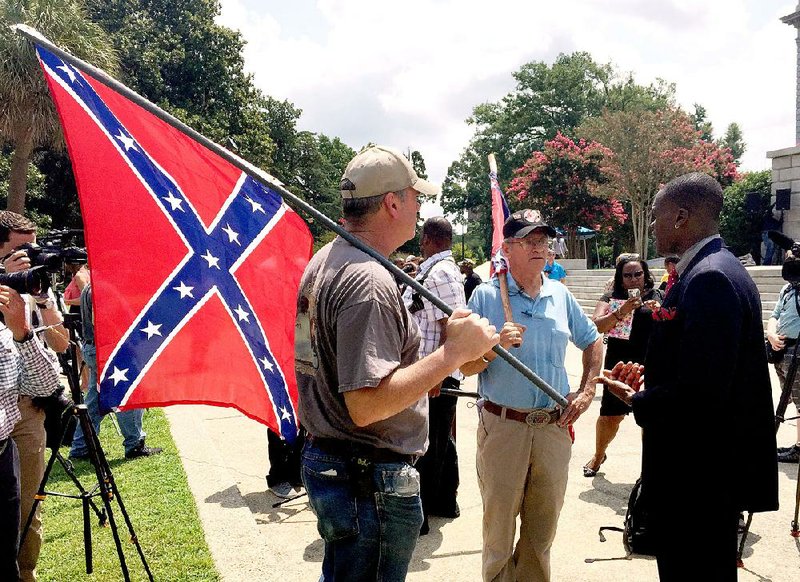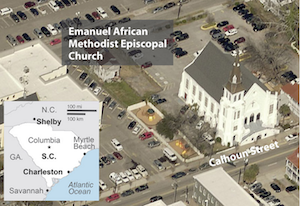COLUMBIA, S.C. -- The South Carolina Senate voted Monday to remove the Confederate battle flag from the grounds of the Statehouse.
The bipartisan proposal, which emerged after last month's mass shooting at a historic black church in Charleston, was approved by a 37-3 vote in the Republican-controlled Senate.
The Senate has one remaining ratification vote. Then the debate will shift to the House of Representatives, which Republicans also control. House leaders said the bill will be sent to their chamber's floor later this week.
The bill requires a two-thirds vote in each chamber. Gov. Nikki Haley has said she wants the flag to come down and will sign the bill.
Monday's vote occurred less than a week after the 15th anniversary of South Carolina taking the flag off the Statehouse dome, where it had flown since the early 1960s, and moving it near a monument honoring Confederate soldiers.
Lawmakers had largely ignored the flag until the killing of nine people, all of them black, during a Bible study at the church on June 17.
Earlier in the debate Monday, the Senate rejected three amendments to the bill. One would have put a different Confederate flag on the pole. A second would have allowed the flag to be flown only on Confederate Memorial Day, and the third would have left the flag's fate up to a popular vote.
After naming the victims of the Charleston tragedy, including the Rev. Clementa Pinckney, the church's senior pastor and a member of the Senate at the time of his death, Sen. Marlon Kimpson, D-Charleston, said, "God is with them, and they are watching us and encouraging us to live our creed." Pinckney's desk in the chamber remained draped in black throughout Monday's debate.
Several white senators said they had come to understand why their black colleagues felt the flag no longer represented the valor of Southern soldiers but rather the racial discrimination that led the South to separate from the United States more than 150 years ago.
Republican Sen. Larry Martin, who for decades fought off attempts to remove the flag from Statehouse grounds, said the church shooting drew him to the conclusion that the flag "has more to do with what was going on in the 1960s as opposed to the 1860s."
Several other senators said the grace shown by the families of the victims in their willingness to forgive the gunman also changed their minds.
"We now have the opportunity, the obligation to put the exclamation point on an extraordinary narrative of good and evil, of love and mercy that will take its place in the history books," said Sen. Tom Davis, a Republican.
But state Sen. Lee Bright, who suggested the popular-vote amendment, said the Confederate flag has been misused by people like Dylann Roof, who is charged with nine counts of murder in the church shootings and who posed in pictures with the rebel banner.
"I'm more against taking it down in this environment than any other time just because I believe we're placing the blame of what one deranged lunatic did on the people that hold their Southern heritage high," said Bright, a Republican. "Removing this flag from out front is not going to do anything to change this nation."
In a roll call vote about 4 p.m. Eastern time, the Senate overwhelmingly voted in support of evicting the flag from the grounds of the Statehouse, where it has flown for more than five decades.
"We did our job," said Sen. Vincent Sheheen, a Democrat who was the lead sponsor of the legislation that the Senate backed Monday. "I do think that it sends a very loud and clear message to the House of Representatives that there is support, momentum, consensus, and I think it helps us clear the hurdles that we need to in the House of Representatives."
Sheheen said the bill, which calls for the flag to be moved to South Carolina's Confederate Relic Room and Military Museum, received greater support in the Senate than he had anticipated.
The bill is expected to be sent directly to the House floor Wednesday with several amendments offered, said Republican Rep. Greg Delleney, chairman of the Judiciary Committee, which would normally receive the bill before it got to the floor.
If any amendments passed, a conference committee would likely be needed to hash out differences.
House Minority Leader Todd Rutherford vowed that no Democrat would vote for a bill that leaves the flagpole up.
Protests at Statehouse
Throughout the day in Columbia, the state capital, protesters milled about outside the Statehouse, including Tom Clements, who has regularly stood near the battle flag to protest its continued presence outside the seat of state power.
"We've been fighting the Civil War my entire life, and I think it's time we removed symbols of the war, which to me stand for racism, off of public property," said Clements, 64. "Because of my Confederate ancestry and because I know that the flag stands for white supremacy, I feel obligated to come out here and ask for it to be removed."
But supporters of the battle flag -- or at least a statewide referendum to decide its fate -- also raised signs and flags. One man used a sign to complain about the governor: "Keep the flag, dump Nikki!" Another criticized the NAACP, which has long pressured the state about the battle flag, as "racist."
Some of the protesters briefly clashed, sending police officers running toward the scene. It did not appear that the authorities made any arrests. Nearby, the Rev. Jesse Jackson stood, watching the demonstrations from the steps of the Statehouse.
"The flag is now a source of embarrassment to the state and could be an impediment to more investment in the state," Jackson said. "But beyond the flag coming down, the Confederate agenda must come down."
But Jackson, who was born in Greenville, also said the massacre in Charleston had "a transformative impact upon the climate of the state."
Inside the Statehouse, emotions appeared far more subdued as lawmakers trickled into the Senate chamber. Near the governor's office, a multidenominational group of Christians sang "Amazing Grace."
"There's going to be a lot of attention on us this week; there's going to be people protesting both sides," Hal Stevenson, who helped to organize the gathering, told the group. "We wanted to come down and, I think, honor the families of the nine victims and the way that they showed grace and try to carry that on in Columbia."
Confederate symbols
Elsewhere, a lawmaker in Tennessee said he plans to slow the effort to remove a bust of a Confederate general and Ku Klux Klan leader from the halls of the Tennessee Capitol.
House Majority Leader Gerald McCormick told The Chattanooga Times Free Press that he thinks a calmer discussion is needed before a final decision is made. He said there has been a wave of "hysteria" over Confederate symbols since the Charleston attack.
McCormick said he still favors removing the statue and intends to talk about the bust when Tennessee's State Capitol Commission meets July 17, but he said the issue needs "a calm, reasonable discussion."
The Republican, who is white, called the uproar over Confederate symbols a "sort of erasing of history that's going on, and it's more of a political movement, I think, than it is a reasonable discussion of these issues."
Democratic Rep. JoAnne Favors, who is black, said: "You cannot erase history because history is there. And because of history, we want to have the statue removed."
She said she doesn't intend to argue with McCormick, but "we would hope that this [bust] would go ahead and be removed."
In Mississippi, a brother of former Gov. Haley Barbour told those in attendance at a rally outside the state Capitol on Monday that the Confederate battle emblem should remain on the Mississippi flag because it honors ancestors who fought for the South in the Civil War.
"They were fighting for the freedom of the South not to get bossed around by a bunch of Yankees," Jeppie Barbour told reporters after he spoke on the Capitol steps.
About 40 people -- all of them white -- participated in the rally.
Days after the attack in Charleston, Mississippi House Speaker Philip Gunn became the first prominent Republican to say the state should change its flag. Citing his Christian faith, Gunn said the Confederate emblem had become divisive. At the rally Monday, people distributed yard signs with the slogan: "Keep the Flag. Change the Speaker."
About 10 people, both blacks and whites, stood and watched the rally Monday. Among them was Joshua Herring, 25, who is black. Herring said the flag should be changed to a symbol that would unify the state.
"We can all agree on a magnolia," Herring said of the state tree and flower. "It can grow under any circumstance."
Gov. Phil Bryant and Lt. Gov. Tate Reeves, both Republicans, have said they accept results of a 2001 statewide election, when people voted nearly 2-to-1 to keep the Confederate symbol that has been on the state flag since 1894.
Haley Barbour, a Republican who was governor from 2004 to 2012, has said he's not offended by the flag. As governor, he frequently wore a state flag lapel pin.
Information for this article was contributed by Alan Blinder and Richard Perez-Pena of The New York Times and by Jeffrey Collins, Seanna Adcox, Emily Wagster Pettus and staff members of The Associated Press.
A Section on 07/07/2015

